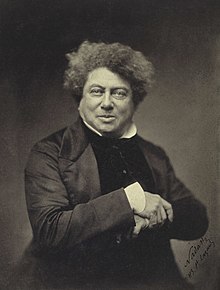Alexander Dumas
| Alexandre Dumas | |
|---|---|

Dumas in 1855
|
|
| Born | Dumas Davy de la Pailleterie 24 July 1802 Villers-Cotterêts, Aisne, French Empire |
| Died | 5 December 1870 (aged 68) Puys (near Dieppe), Seine-Maritime, Republic of France |
| Occupation | Novelist, playwright |
| Nationality | French |
| Period | 1829–1869 |
| Literary movement | Romanticism and Historical fiction |
| Notable works |
The Three Musketeers (1844) The Count of Monte Cristo (1844-1845) |
| Relatives |
|
|
|
|
| Signature |  |
Alexandre Dumas (English /duːmˈɑː, djuː-/, French: [alɛksɑ̃dʁ dyma], born Dumas Davy de la Pailleterie [dyma davi də la pajətʁi]; 24 July 1802 – 5 December 1870), also known as Alexandre Dumas, père, was a French writer. His works have been translated into nearly 100 languages, and he is one of the most widely read French authors. Many of his historical novels of high adventure were originally published as serials, including The Count of Monte Cristo, The Three Musketeers, Twenty Years After, and The Vicomte de Bragelonne: Ten Years Later. His novels have been adapted since the early twentieth century for nearly 200 films. Dumas' last novel, The Knight of Sainte-Hermine, unfinished at his death, was completed by a scholar and published in 2005, becoming a bestseller. It was published in English in 2008 as The Last Cavalier.
Prolific in several genres, Dumas began his career by writing plays, which were successfully produced from the first. He also wrote numerous magazine articles and travel books; his published works totaled 100,000 pages. In the 1840s, Dumas founded the Théâtre Historique in Paris.
Dumas' father, General Thomas-Alexandre Davy de la Pailleterie, was born in the French colony of Saint-Domingue (present-day Haiti) to a French nobleman and an enslaved African woman. At age 14 Thomas-Alexandre was taken by his father to France, where he was educated in a military academy and entered the military for what became an illustrious career.
...
Wikipedia
